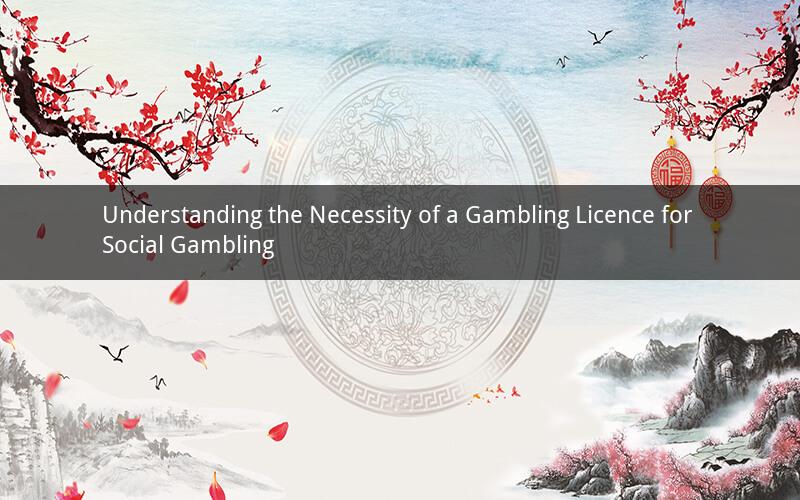
In the world of gambling, the distinction between social gambling and commercial gambling is crucial. While social gambling involves activities that are typically non-commercial and conducted among friends or family, commercial gambling involves betting for money and requires a gambling licence. The question arises: do you need a gambling licence for social gambling? This article delves into the intricacies surrounding this topic, exploring the reasons behind the need for a licence, the exceptions, and the potential consequences of operating without one.
The Importance of a Gambling Licence
A gambling licence is a legal document issued by a regulatory authority that grants an entity the permission to conduct gambling activities. The primary purpose of a gambling licence is to ensure that gambling is conducted in a fair, transparent, and responsible manner. Here are a few reasons why a gambling licence is important:
1. Consumer Protection: A gambling licence ensures that consumers are protected from fraudulent and dishonest operators. By requiring operators to adhere to certain standards, authorities can minimize the risk of consumers being exploited.
2. Responsible Gambling: A gambling licence promotes responsible gambling practices by requiring operators to implement measures that help prevent problem gambling. This includes providing resources for individuals who may need assistance in managing their gambling habits.
3. Tax Revenue: Gambling licences generate tax revenue for governments, which can be used to fund public services and infrastructure.
Exceptions to the Rule
While it is generally required to obtain a gambling licence for commercial gambling activities, there are exceptions for social gambling. Here are some scenarios where a gambling licence may not be necessary:
1. Non-commercial Events: If a gambling event is organized for a non-commercial purpose, such as a charity auction or a community fundraising event, a gambling licence may not be required.
2. Private Gatherings: Social gambling among friends or family members in a private setting is typically not considered commercial gambling and may not require a gambling licence.
3. Small, Informal Gatherings: Informal gatherings with a small number of participants, such as a friendly poker game among acquaintances, may not require a gambling licence.
Potential Consequences of Operating Without a Licence
Despite the exceptions, it is essential to understand that operating a gambling business without a gambling licence can have serious consequences. Here are some potential repercussions:
1. Legal Action: Authorities can take legal action against operators who operate without a gambling licence, including fines, penalties, and the closure of the business.
2. Reputation Damage: Operating without a gambling licence can tarnish the reputation of an operator, making it difficult to gain the trust of consumers and partners.
3. Financial Loss: Legal action and fines can result in significant financial loss for operators who operate without a gambling licence.
Frequently Asked Questions
1. What is the definition of social gambling?
Social gambling refers to gambling activities that are conducted for non-commercial purposes, such as among friends or family members, and do not involve the exchange of money.
2. Can a social gambling event generate revenue without requiring a gambling licence?
Yes, a social gambling event can generate revenue without requiring a gambling licence, as long as it is conducted for non-commercial purposes and does not involve the exchange of money for gambling activities.
3. Is it legal to operate a gambling business without a gambling licence?
No, it is illegal to operate a gambling business without a gambling licence. Authorities can take legal action against operators who violate this rule.
4. Can a social gambling event be held at a commercial venue?
Yes, a social gambling event can be held at a commercial venue, as long as it is conducted for non-commercial purposes and does not involve the exchange of money for gambling activities.
5. How can I obtain a gambling licence for my business?
To obtain a gambling licence, you must apply to the relevant regulatory authority in your jurisdiction. The application process typically involves providing detailed information about your business, including its operations, financials, and compliance measures.
In conclusion, while social gambling is generally exempt from the requirement of a gambling licence, it is crucial to understand the exceptions and potential consequences of operating without one. By adhering to the rules and regulations surrounding gambling, operators can ensure a fair, transparent, and responsible gambling environment for all participants.